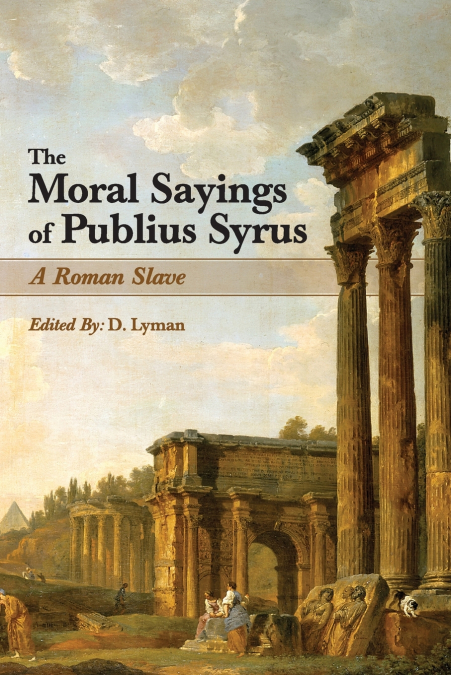
 Librería Desdémona
Librería Desdémona
 Librería Samer Atenea
Librería Samer Atenea
 Librería Aciertas (Toledo)
Librería Aciertas (Toledo)
 Kálamo Books
Kálamo Books
 Librería Perelló (Valencia)
Librería Perelló (Valencia)
 Librería Elías (Asturias)
Librería Elías (Asturias)
 Donde los libros
Donde los libros
 Librería Kolima (Madrid)
Librería Kolima (Madrid)
 Librería Proteo (Málaga)
Librería Proteo (Málaga)
The Moral Sayings of Publius Syrus, A Roman Slave is a collection of proverbs and aphorisms pulled from the many mimes and plays of Publius Syrus. Enslaved by the Romans in his youth, this witty man went on to conquer the Roman stage. These maxims, believed to have been collected in the 1st century AD, are all that remain of the great playwright’s work. Born in Syria in the 1st century BC, Publius Syrus was enslaved and brought to Rome by an army officer after the Romans conquered his native country. It was in Rome that he was given the name of Syrus, for his place of origin. He was then around 12 years old. This soldier had a patron who was delighted with the boy and requested that the soldier give Syrus to him. The soldier complied. Syrus’ new master found the boy witty and bright and was often entertained with his commentary. With such promise, the master provided Syrus with an education and later freed him. Syrus was immensely grateful and remained friends with his former master for the rest of his life. He took the surname Publius, which was probably the surname of his master. Newly free, Syrus traveled to Italy and began composing mimes-comical farces often used to 'represent the failings and eccentricities of the higher classes, and the vulgar language and solecisms of the lower.' This combination of humor and moralism was widely popular among the Romans of the time, and Syrus earned great acclaim as a poet and actor. When Caesar was re-elected as Dictator, he planned days of games and performances to entertain his subjects. Syrus was invited to perform, among many other writers and actors. When he arrived back in Rome, he challenged the other poets to a battle of wits, where he beat them all. He went on to dominate the Roman stage for the rest of his life. None of the great master’s plays have survived the ensuing centuries. But fortunately, many of his pithy maxims were collected from his plays, probably in the 1st century AD, and gathered into a single volume. This collection was translated from the Latin and first published in 1856. Included among the 1,087 proverbs are some that appear to be the foundation-or at least an early version-of sayings we still use today. For example, #1086 states, 'When the dog is too old you cannot get him used to the collar.' Could this be the source of today’s 'You can’t teach an old dog new tricks'? And #1076 advises, 'If you gain new friends, don’t forget the old ones.' This is quite similar to 'Make new friends but keep the old.' There are many more sayings that have not become part of our common lexicon but are still worth considering. ● #47 - The plainer the table, the more wholesome the food.● #58 - When the tree has fallen, anyone can cut wood.● #91 - He who boasts of a favor bestowed, would like it back again. ● #144 - Society in shipwreck is a comfort to all.● #324 - Man’s life is a loan, not a gift. Still others seem to contradict each other. For example, #184 states that 'Wisdom is acquired by meditation.' But the very next, #185, states 'While we stop to think, we often miss our opportunity.' In the same vein, #263 says that 'No one ever lost honor but him who never had any.' And then #264 says 'He who has forfeited his honor can lose nothing more.'While additional context regarding these quotes would be useful, they still have value on their own. These 1,087 proverbs, written over 2,000 years ago, have provided a second fame for the brilliant playwright, and are a worthy study.